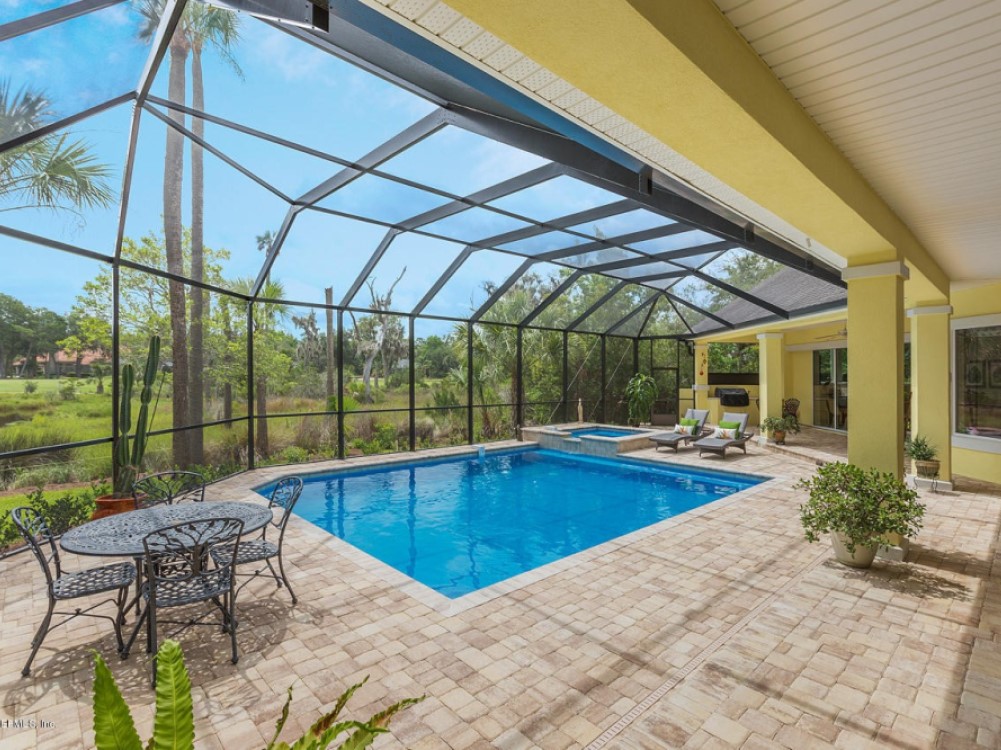Demystifying Water Balance Testing: What Every Pool Owner in Jacksonville, FL Should Know
In Jacksonville, Florida, where it's always hot, having your own pool is not only a nice-to-have, but also a great way to cool off. It's a private paradise where you can unwind, have fun, and make memories that will last a lifetime. But having a pool means more than just enjoying its benefits; you also have to take care of it.
Testing the water balance is one of the most essential aspects of maintaining a pool. Many pool owners might find this daunting and difficult. However, it's a simple process that is very important for keeping your pool safe, clean, and gleaming.
The goal of this article is to demystify water balance testing. We'll explain what it means, why it's important, and how you can achieve it. Our goal is to give you the skills and confidence to take care of your pool so that it stays a source of fun and relaxation for many years to come.
Don't worry if you've had your pool for years or just bought it. This guide is for everyone. Let's learn more about water balance testing and how important it is for keeping your Jacksonville, FL pool safe and clean.
What is Water Balance Testing?
Testing the water balance is an important part of maintaining pools and making sure they meet water quality standards. This process makes sure that the pool water stays in great shape by carefully checking chemical makeups like pH, alkalinity, and sanitizer levels. Keeping these chemicals at the right levels not only protects swimmers' health and comfort, but it also makes the pool infrastructure last longer. Because of this, testing the water balance is necessary to keep the swimming area safe and fun.
Basically, testing the water balance is a way to keep dangerous problems from occurring when the water in a pool isn't balanced.
By being proactive, problems like skin and eye irritation, bacterial growth, and equipment corrosion are less likely to happen. Maintaining the overall integrity of a swimming pool is easy for pool owners who stick to a regular schedule for testing the water.
Additionally, testing the water balance isn't just done in private resident’s pools; it's also done in public and commercial pools. Make sure that everyone uses a clean and comfortable space by regularly checking and changing the chemistry of the water. In the end, testing the water balance becomes an important part of owning and managing a pool responsibly. It protects swimmers' health and the pool's structure for a long time.
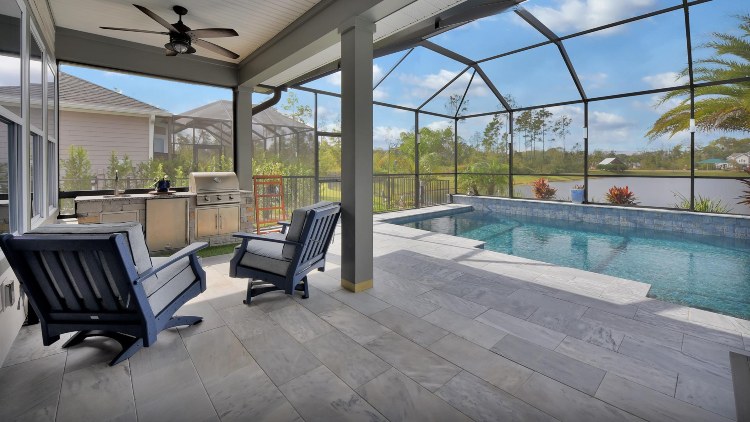
Why is Water Balance Testing Important?
Maintaining the right water balance is crucial for several reasons:
- Health and Safety: Keeping the water balance right in a pool is crucial for many reasons. First, it has to do with health and safety issues, since pool water that isn't balanced properly can cause a wide range of health problems, from minor skin irritation to more serious problems with the eyes and lungs. Problems with these health areas not only make swimming less fun, but they can also be very dangerous, especially in public or very busy pools.
- Pool Longevity: Keeping the water balance right is important for the longevity of the pool's structure. If the chemistry of the water isn't balanced, it can eat away at a pool’s surface and damage the pumps, filters, and heaters. As a result of all of these damages, the pool may need extensive and expensive repairs or even the replacement of key parts, which would have a big effect on its ability to function and make money.
- Comfort: Finding and keeping the right balance in the water is important for swimmers' comfort. When water is properly balanced, it not only feels better on the skin and eyes, but it also makes swimming more fun overall. Pool owners can create a place where people want to relax and have fun by adjusting things like pH, alkalinity, and sanitizer levels. This makes customers happier and encourages them to come back. So, putting water balance first isn't just a matter of functionality; it's also a key part of customer service and keeping customers in the recreational aquatics industry.
How to Test Your Pool Water
Testing your pool water is a simple process that you can do yourself with a home test kit. Here’s how:
- Collect a Water Sample: Testing the quality of your pool's water is an easy but important part of proper maintenance. You can do these tests yourself using a home test kit, which saves you time and money. To start the testing process, take a sample of the water from your pool. Most of the time, this is done by putting a clean container, like a plastic cup or ladle, about elbow-deep into the pool water. To get a good sample representation, you must make sure that the container is clean and free of any contaminants or residues.
- Test the Water: Once you have the water sample, it is time to do the testing. Most home test kits come with testing strips or other chemicals that can be used to find out things about the chemistry of your water, like its pH, chlorine or sanitizer levels, alkalinity, and sometimes calcium hardness. Carefully follow the maker's instructions and either put the testing strip into the water sample or add the right number of drops of reagent.
- Read the Results: Once the testing is done, wait the amount of time that was given for the testing strip or reagent to react with the water sample. This time is usually between a few seconds and a minute. The testing medium will change color because of this reaction. You will then compare this change to a color chart that came with your kit. The color chart will show the corresponding values for each parameter being tested. This will help you get accurate readings of pH, sanitizer levels, alkalinity, and other important water balance factors.
It is very important to correctly interpret the results in order to make good decisions about any changes that need to be made to your pool's water chemistry. If the color of the test strip or sample water doesn't match the colors on the chart, write down the values you got for each parameter you tested. Tracking changes in water quality over time is easier with these recorded measurements. They also help find trends or patterns that might need attention or action.
By using a home test kit to check the water in your pool on a regular basis, you can do preventative maintenance and keep your pool a safe, fun place to swim. By fixing any imbalances or deviations from ideal water chemistry right away, you can avoid problems like damaged equipment, water-borne illnesses, and discomfort for swimmers. This will make your pool last longer and make swimming more enjoyable overall.
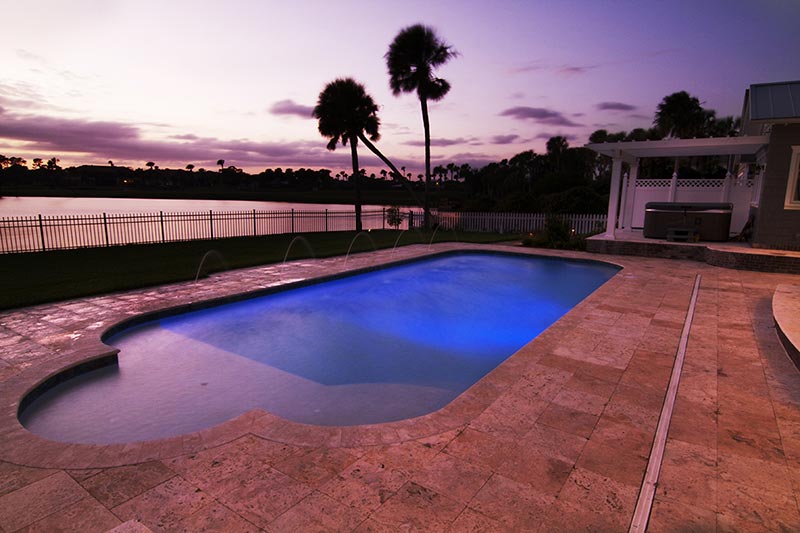
Understanding Your Test Results
It is important to know the results of your pool water tests in order to keep the swimming area healthy and balanced. Each parameter you measure tells you something useful about the chemicals in your pool water, so you can make changes that will make the water better for swimming and your equipment last longer.
Here’s what you need to know about the chemical levels in your pool water:
- pH Level: This indicates the acidity or alkalinity of your pool water with the ideal range falling between 7.4 and 7.6 on the pH scale. Keeping the pH in this range is very important because it has a direct effect on how well sanitizers work, how clear the water is, and how comfortable it is for swimmers. If the pH level isn't in the right range, it can irritate the skin and eyes, eat away at pool surfaces, and make chlorine or bromine less effective.
- Alkalinity: This acts as a buffer to keep pH levels stable, stopping sudden changes that could hurt the quality of the water. Alkalinity should stay between 100 and 150 parts per million (ppm), if possible. The right amount of alkalinity helps keep the pH in the right range and makes the water more stable overall, so you don't have to change the pH as often and the quality of the water stays the same.
- Sanitizer Levels: These are very important for keeping bacteria, algae, and other harmful things from getting into your pool water. Chlorine or bromine are the main disinfectants used. The best chlorine level is usually between 1.0 and 3.0 parts per million (ppm). Having the right amount of sanitizer in the water helps stop the spread of water-borne diseases, keeps the water clear, and makes pool equipment last longer. However, too much sanitizer can cause problems like skin irritation and a strong chlorine smell, while too little can mean that the water isn't properly disinfected and the quality isn't good.
For a safe and enjoyable swimming experience, it is important to check and change the pH, alkalinity, and sanitizer levels on a regular basis based on test results. Along with these main parameters, other things like calcium hardness, cyanuric acid (CYA) levels, and total dissolved solids (TDS) should be checked and kept within the recommended ranges on a regular basis to keep the water in balance and avoid problems like scaling, cloudy water, or equipment damage.
By quickly analyzing and acting on test results, pool owners can fix any imbalances and keep the water quality at its best, which protects swimmers' health and the longevity of their pool equipment. Setting up a regular testing schedule and keeping accurate records of test results makes ongoing maintenance and troubleshooting easier. This way, you can enjoy your pool to its fullest while lowering the risk of expensive repairs or health problems.
Conclusion
By making testing the water balance a regular habit, you can turn your pool from a fun place to hang out into a peaceful and joyful sanctuary. Think of the sound of loved ones laughing and reverberating off of the water, knowing that every dip will be safe and refreshing. When you carefully adjust each chemical level, your pool is more than just an addition to your home; it's a place where you can spend time with your family and friends.
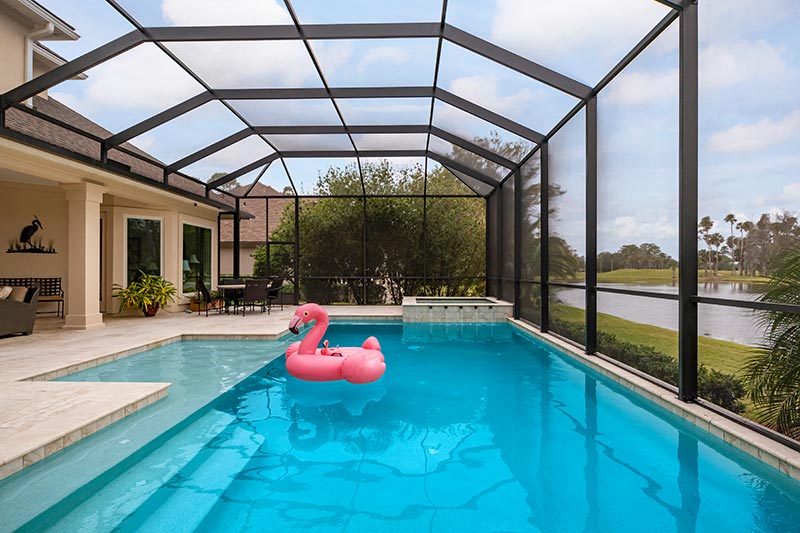
At Coastal Luxury Outdoors of Jacksonville, FL, we know how much a well-kept pool can change a space. We're committed to excellence in more ways than just maintenance. We're also committed to creating a space where people can relax and feel refreshed. Our team takes great care of every part of pool maintenance, from the finer points of changing the pH level to the more complicated issues of sanitizer levels.
With Coastal Luxury Outdoors, you can take your pool experience to a whole new level. Trust us to take care of your aquatic oasis, and you'll enjoy the peace of mind that comes from knowing your pool is in good hands. We are ready to go above and beyond your expectations, whether you need a water balance test, new equipment, or personalized design advice. Get in touch with us right away to start your journey towards your dream pool.
Recent Blog Articles

Creative Patio Ideas Using Pavers for Outdoor Living Spaces
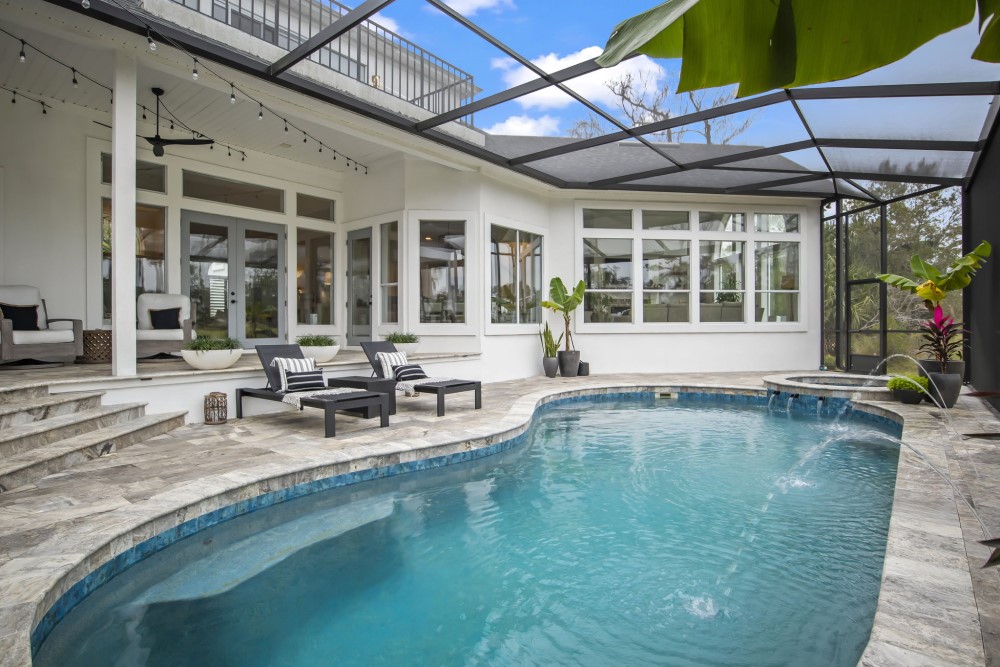
Plaster Options: Pebble vs. Quartz
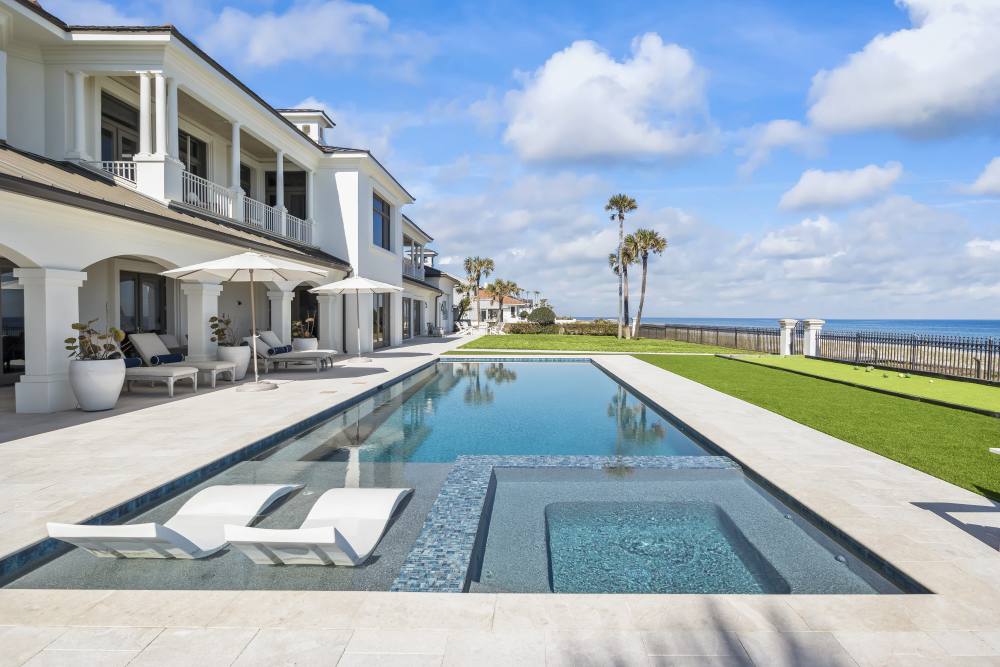
Choosing the Right Spa Spillway for Your Pool
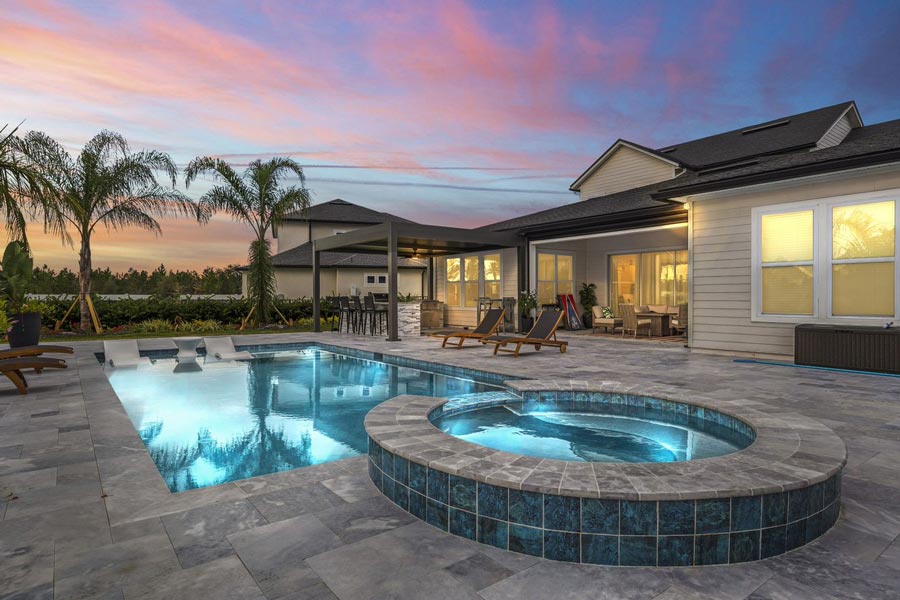
How Much Does It Cost to Build a Pool in Florida (2025 Price Guide)
